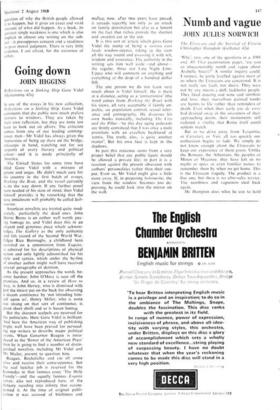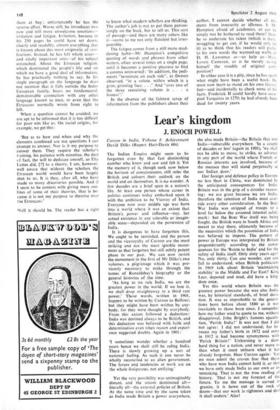Numb and vague
JOHN JULIUS NORWICH
The Etruscans and the Survival of Etruria Christopher Hampton (Gollancz 42s)
'Why', runs one of the questions in a 1066 and All That examination paper, 'are you so unaccountably numb and vague about Arabella Stuart?' A similar inquiry could. I suspect, be justly levelled against most of us where the Etruscans are concerned. It is not really our fault, nor theirs. They were not by any means a dull, lacklustre people. They liked dancing and wine and sunshine and love; their marvellous painted tombs are hymns to life rather than reminders of death. Even when their early joie de vivre had drained away in the awareness of their approaching doom, their monuments still radiated a vitality that Rome itself could seldom match.
But as we drive away from Tarquinia, or Cerveteri, or Veii, all too quickly our enthusiasm begins to fade. We simply do not know enough about the Etruscans to keep our experience of them green. Unlike the Romans, the Athenians, the peoples of Minos or Mycenae. they have left us no myths or epics or even familiar names to remember them by when we get home. This is the Etruscan tragedy. The product is a fine one, but there is no after-sales service. The numbness and vagueness steal back again.
Mr Hampton does what he can to hold
them at bay ; unfortunately he has the reverse effect. Worse still, he introduees two new and still more unwelcome emotions— irritation and fatigue. Irritation, because in his 250 pages he could have set down, clearly and readably, almost everything that is known about this most enigmatic of civi- lisations. Instead, he has left whole areas— and vitally important ones—of his subject untouched. About the Etruscan religion. which dominated the people's life and on which we have a good deal of information, he has practically nothing to say. In his single paragraph on the language he does not mention that it falls outside the Indo- European family, bears no fundamental. demonstrable connection with any other language known to man, or even that the Etruscans normally wrote from right to left.
When a question cannot be avoided, we are apt to be informed that it is too difficult for poor nits like us. On racial origins, for example, we get this: `But as to how and when and why the elements combined are not questions I can attempt to answer. Nor is it my purpose to answer them. They require the scholar's training, his patience with minutiae, the dust of fact, the will to dedicate oneself, as Elia Lattes did, [?] to a theory. I am, however, well aware that without the scholars the Etruscan world would have been largely shut to us. It is they, after all, who have made so many discoveries possible. And if I seem to be content with giving mere out- lines of some of their theories, that is be- cause it is not my purpose to theorise over the Etruscans.'
Well it should be. The reader has a right to know what modern scholars are thinking. The author's job is not to pat them patron- isingly on the back, but to tell us. This sort of passage—and there are many others like it—seems to me not only flatulent but irres- ponsible.
The fatigue comes from a still more mad- dening habit—Mr Hampton's compulsive quoting of words and phrases from other writers, often several times on a single page, until it becomes a positive pleasure to find a comma uninverted: 'In addition, the pedi- ments "terminate on each side", as Dennis observed, "in a volute. within which is a grim, grinning face. . .." And "over two of the three remaining volutes is . . . a lioness".'
In the absence of the faintest scrap of information from the publishers about their author, I cannot decide whether all this stems from insecurity or idleness. Is Mr Hampton afraid of academics, or can he simply not be bothered to read them? Does he so underrate his talent (which is there. struggling to get out, if he would only let it) as to think that his readers will prefer to his own words the warmed-up waffle of D. H. Lawrence or—so help us—Man Lovett Cameron, or is he merely saving himself the trouble of original com- position?
In either case it is a pity, since he has spoilt what might have been a useful book. He must now learn to stand on his own literary feet—and incidentally to check some of his facts. Frederick II could hardly have occu- pied Tarquinia in 1270; he had already been dead for twenty years.



































 Previous page
Previous page